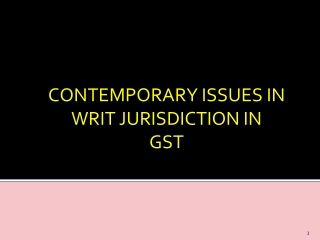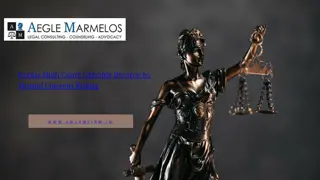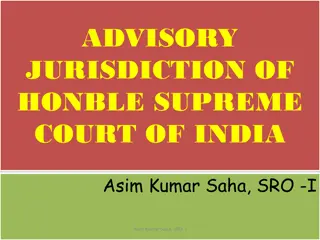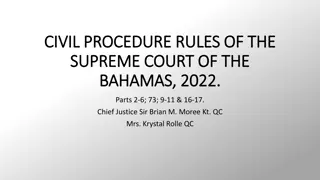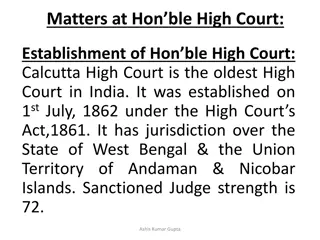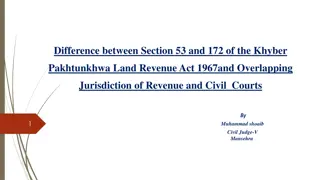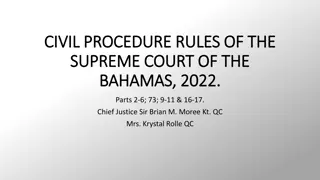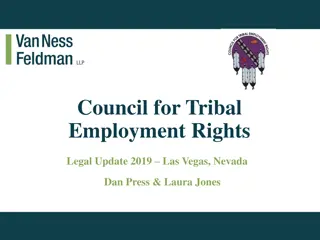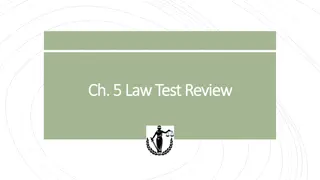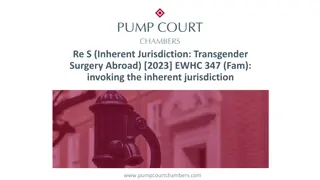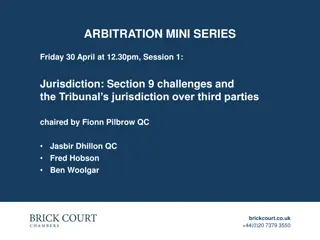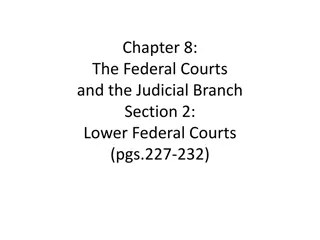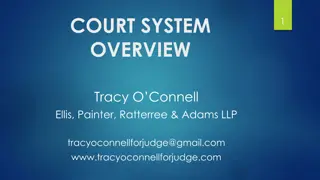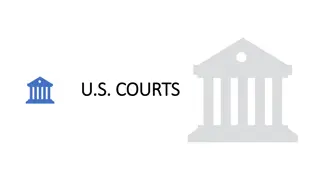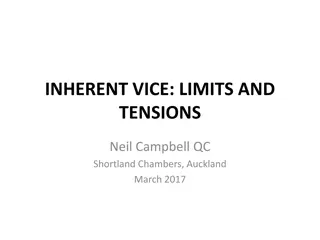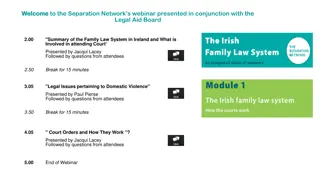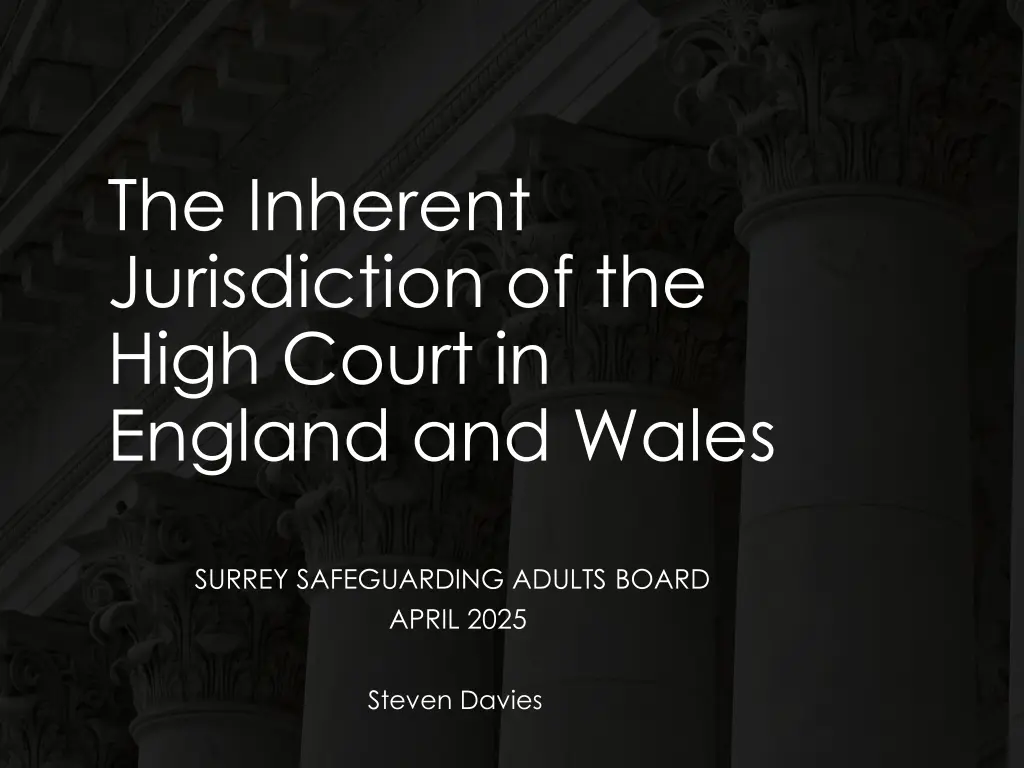
Understanding the Inherent Jurisdiction of the High Court in England and Wales
Explore the concept of the Inherent Jurisdiction of the High Court in England and Wales, a vital legal tool to protect vulnerable adults not covered by the Mental Capacity Act. Learn when and how this jurisdiction can be applied, illustrated by relevant case examples.
Download Presentation

Please find below an Image/Link to download the presentation.
The content on the website is provided AS IS for your information and personal use only. It may not be sold, licensed, or shared on other websites without obtaining consent from the author. If you encounter any issues during the download, it is possible that the publisher has removed the file from their server.
You are allowed to download the files provided on this website for personal or commercial use, subject to the condition that they are used lawfully. All files are the property of their respective owners.
The content on the website is provided AS IS for your information and personal use only. It may not be sold, licensed, or shared on other websites without obtaining consent from the author.
E N D
Presentation Transcript
The Inherent Jurisdiction of the High Court in England and Wales SURREY SAFEGUARDING ADULTS BOARD APRIL 2025 Steven Davies
Inherent Jurisdiction (IJ) What is it ? the ability of the High Court to make declarations and orders to protect adults who do not fall within the scope of the Mental Capacity Act 2005 but who are in some way vulnerable whose ability to decide is compromised by the actions or inactions of other people. (Ruck Keene et al, 2024) A developing jurisdiction complementary to statutory provisions of the Mental Health Act (MHA)1983 and Mental Capacity Act(MCA) 2005 involving vulnerable and or/incapacitated adults. Used in decisions involving serious medical treatment, welfare, deprivation of liberty and safeguarding.
Inherent jurisdiction When can it be used ? A person is unable to make a decision, and they are at risk in some way from the actions or inactions of another or themselves. When the capacity assessment takes place, a key question should be what is the real or material reason that the adult is unable to make the decision? If it is the adverse influence of another it may be appropriate to seek to invoke the inherent jurisdiction. If the reality is that the person lacks capacity to make the relevant decision, then it is inappropriate to invoke the Inherent Jurisdiction.
Re T [1992] 3 WLR782 Pregnant daughter of Jehovah s witness and blood transfusion Spoke to mother in hospital and declined blood transfusion in all the circumstances she lacked capacity to take the decision regarding a blood transfusion. Mother had vitiated her decision
Re SA(Vulnerable Adult) with capacity: Marriage [2005] EWHC 2942 Fam can be exercised in relation to a vulnerable adult who even if not capacitated by mental disorder or illness is or reasonably believed to be either Under restraint or Subject to coercion or undue influence or For some other reason deprived of the capacity to make the relevant decision, or disabled from making a free choice, or incapacitated or disabled from giving or expressing a real and genuine consent. (i) (ii) (iii)
A Local Authority v DL[2011]EWHC 1022 Fam All legal options explored and rejected Necessary and proportionate Investigation of less intrusive measures Intervention was facilitative rather than dictatorial Re-establish the individual s autonomy of decision making in manner which enhances rather than breaches their ECHR Article 8 rights.
Re FD [2017] Injunction arising from Wardship proceedings, protecting a vulnerable child from GH and AD On 18th birthday the Court of Protection ordered new mental capacity assessment Psychiatrist found that FD did have capacity to make certain decisions but was nevertheless extremely vulnerable Court agreed to continue with injunctions against both men No power of arrest attached.
(Truly)Exceptional use of the Inherent Jurisdiction Making orders against the person themselves where there is a third party presence or Where the sole is risk if from the actions of the person themselves(no third party presence) Where a person lacks capacity but MCA cannot be used for some reason
IJ,MCA 2005 and MHA 1983 Both statutory schemes aim to protect vulnerable individuals, but they differ in their focus and application. The MCA 2005 deals with decision-making for those who lack capacity, whereas the MHA 1983 addresses the treatment of mental health disorders Additionally, MCA 2005 emphasizes best interests and participation, while MHA 1983 provides guidelines for compulsory admission and treatment Neither addresses situations where oppressive dynamics are the sole or material reason for incapacity or a liability to be detained.
IJ, MCA 2005 and MHA 1983 In an NHS Trust v Doctor A[2013], a patient needed to be deprived of his liberty and was resisting medical treatment. The treatment was not relevant to a mental disorder or impairment so the MHA could not be used for forced- feeding(the treatment for physical issues not related to mental health) Nor could the MCA be used due to S16A* This created a gap in the law. Under the IJ the court was able to make orders for nutrition and hydration as the other relevant legislation was preclusive.
Inherent Jurisdiction However, the IJ has been criticised Referred to as amorphous and illusive Breach of ECHR rights Not a lawless void permitting judges to do whatever we consider to be right (Redbridge LBC v A [2015]) Can be a protective imperative (Mazhar v Birmingham[2020[)
Inherent Jurisdiction Checklist before making an application: Before making an application consider what other legislative mechanisms exist and whether they have been tried. Is the interference with a person s rights necessary & proportionate? Orders directed against the individual? Is presiding judge authorised under s9(1) Senior Courts Act 1981 to hear the application?
Without notice(ex parte) applications Only ex parte in exceptional and urgent circumstances. Complete information required to include: Reasons Full and frank disclosure Full record of court hearing Why the IJ is applicable in the circumstances Facts to be recorded in the Order along with Recital Order should include the basis on which the court has reason to believe it is empowered to make such an order Return to court ASAP 1. 2. 3. 4. 5. 6. 7.
IJ, SARs and legal literacy Safeguarding Adult Review s44 Care Act National analysis of SARs(2016 -2023) 40% SARs highlighted an absence of legal literacy and non-consideration of Inherent Jurisdiction (Bedford et al, 2025) Clusters of cases identified in the research Familial and domestic abuse Community exploitation Self-neglect
IJ, SARs and legal literacy Familial and domestic abuse family conflicts and relationships not fully explored coercive family dynamics Effects of statutory schemes and interventions Exclusion and homelessness (Molly SAR Teeswide, 2022)
IJ, SARs and legal literacy Community based exploitation cuckooing exploitation where a home is taken into the control of others for illicit purposes(MacDonald et al, 2022) consent for others to enter their homes(Adult P SAR, Southampton 2019, Carol SAR, Teeswide 2017) declined alternative and safer accommodation(Max SAR, Bedfordshire 2022)
IJ, SARs and legal literacy Self neglect Are there coercive dynamics from a third party? If so, the IJ may offer a remedy by restricting the actions of the adverse influence (David SAR Rotherham, 2021 In Harry, his friends were unduly influencing him to pay for his care Refusals to medical treatment for leg ulcers, DVT, sepsis where coercion was a factor(Miss T SAR IoW 2016, Honor SAR Swindon, 2017)
A last resort? A residual power where other remedies are not applicable or available. It is not necessary for all possible responses to have failed before the IJ can be considered(Bedford et al, 2025) The key issue is whether a less intrusive measure could achieve the intended objective without unacceptable compromise (R (Lord Carlile of Berriew QC) v SSHD [2014])
Some final thoughts IJ is not a panacea Need for policy development in light of existing case law and what IJ can and cannot offer Consider what remedies might be realistic and pragmatic in light of this
References Bedford et al (2025) Rethinking the Inherent Jurisdiction of the High Court in Safeguarding Adult Reviews: Beyond Legal Literacy;JK publishing Bedford_et_al_2025_AAM.pdf Mandelstam M (2019) Safeguarding Adults and the Law (2008) Weereratne et al (2008) A guide to the MCA 2005 Lexis Nexis;Butterworths. Ruck-Keene A, et al (2024) Using the Inherent Jurisdiction in Relation to Adults 39 Essex Chambers.

